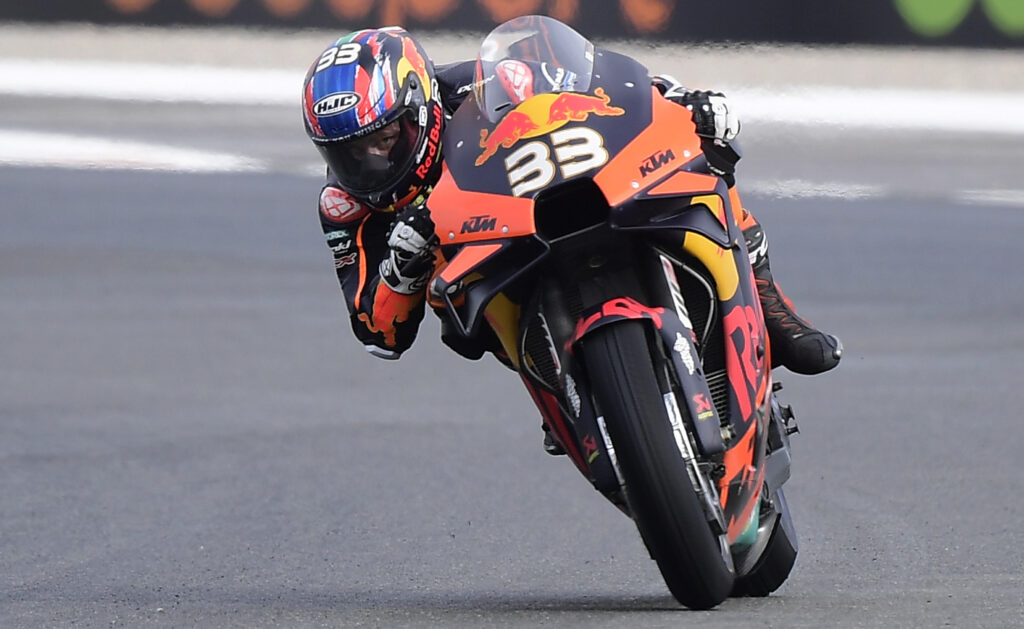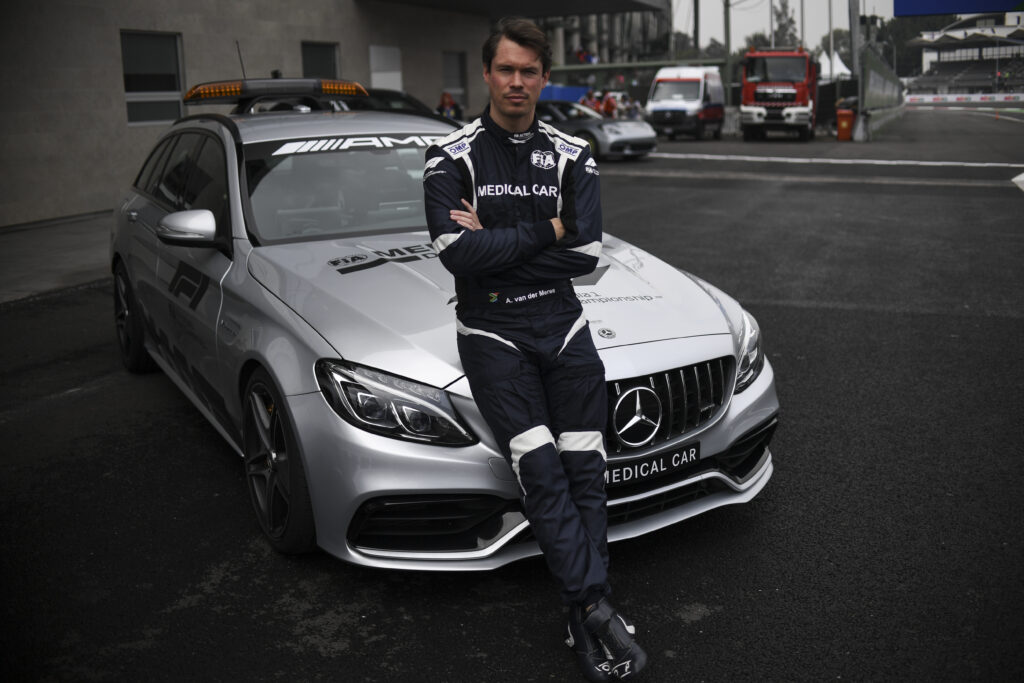Pacesetter: Brad Binder celebrates (below) after winning the MotoGP Czech Grand Prix on 9 August this year. (Joe Klamar / AFP)
This time last year South Africa was still soaking up the incredible success of winning a third Rugby World Cup. In the haze of our celebrations and hangovers, no one would have assumed that a few months later we would have no sport to watch, let alone to cheer.
Rushed Bafana friendlies and empty cricket stadiums aside, there’s decidedly little to talk about as we gaze back on our favourite pastimes.
Which is why our one unquestioned success in the sporting realm has come to mean so much to many.
Brad Binder has taken the flag to the highest pinnacle of MotoGP — creating history before being named as the best newcomer to the circuit.
“It was great to get the rookie of the year title, for sure,” he tells the Mail & Guardian. “I would have liked to have got a lot more in the general standings, but with all my mistakes I made this year and all the crashes … not finishing when I had really good results on offer, really hurt me in the championship. But at the end of the day it’s the speeds there; I just have to try to sort it all out and we’ll be strong next year I hope.”
Now back home in South Africa for the first time since June, Binder remains highly critical of himself as he reflects on his debut season in the world’s premier superbike competition. Overall he finished 11th (out of 25), not a position to be ashamed of at all. But considering his early form one can understand why it feels a shade anticlimactic to him.
Of course, this takes away nothing from the milestones he set. In only his third race, the KTM rider took pole in the Czech Republic — becoming the first South African to win a MotoGP World Championship race and the first rookie to do so since 2013.
“Honestly, it took a few days … I don’t know if it was weeks … it’s something that didn’t really sink in at all,” he says of the aftermath.
“The two races before that I was really fast, but crashed in the one and the other one I went off track … I came back from last to finish nowhere anyway,” Binder says.
“So it’s crazy. I went into that race with the goal to just finish and have a clean race. But then I started to realise I had a lot of extra pace on the other guys. It was an amazing feeling to just be able to overtake and disappear.”
The novelty of 25-year-old Binder’s achievement was in keeping with the tone of a frenetic season, one bridled with uncertainty that produced a wild few months of racing.
 It was Binder’s first season of competing on the MotoGP circuit; he finished a credible 11th place in the overall standings. (JOSE JORDAN / AFP)
It was Binder’s first season of competing on the MotoGP circuit; he finished a credible 11th place in the overall standings. (JOSE JORDAN / AFP)
Like every other sport, MotoGP had to confront its insignificance in a world that had awoken to a new peril. When it eventually did manage a delayed start, organisers were forced to cram a limited set of grand prix on to the schedule — all of which took place in Europe.
During the first race, defending champion Marc Márquez would fracture his humerus in a crash, taking himself out of contention for a fifth consecutive title and blowing the field wide open. Equally notable was that the legendary Valentino Rossi endured the worst season of his 20-year career — partially a result of an extended bout of Covid-19.
“It was a rough year for everybody,” Binder acknowledges.
“To be honest, I’m hugely surprised that we managed to get 14 rounds in; there was a stage when it was looking like we weren’t going to get one.
“On the one hand, it’s been cool because I’ve had the opportunity to redo some circuits where we’ve had two in a row, but, at the same time, I’ve missed out on the opportunity to go to a good half of the circuits that I’m going to have to learn on the MotoGP bike when I go there for the first time next season.
“I think it’s almost made my rookie year a two-year process,” he says.
“Anyway, it was unfortunate to see Marc crash out and not come back already at the first round. But that’s just one of those things with racing: if you’re going to push the limit, eventually it’s going to bite you.”
After the mayhem of the series, life should be comparatively normal for Binder this holiday period. He’s a bona fide superstar in the motosport community — and admits to being recognised a lot more — but South Africa still offers sanctuary away from the scrap to be half a second faster.
Having a solid base back home has worked out well not just for him but his younger brother too. Darryn Binder, 22, is a professional racer in the Moto3 class and will have ambitions of also making the step up to the top of the sport in the near future.
Should that happen it will help, one would think, to have a sibling that has already got the rookie mistakes out his system.
“Sometimes I think I just wanted a little bit too much too soon. Even when I had the pace and everything I was just a little bit too anxious to try to make moves and get to the front,” Binder says, pondering his improvements for 2021.
“It’s something that I need to work on for next season, but, at the same time, I’ll always have a huge desire to win, regardless of where I start or how things have been going.
“I think on, one hand, it’s fantastic, but, on the other hand, it can hurt you quite often as well. I need to try to find that balance there, but other than that I’m quite happy with the way things have gone,” Binder says.
“It’s been challenging for me; it hasn’t been easy at all. But we need to take positives out of it: we won a race this year; I’ve beaten guys that I’ve looked up to my whole career, some of the fastest guys in the sport. From here on out we just need to keep working.”
Behind the scenes with F1’s crack medical team
Another South African making waves in the racing world is Alan van der Merwe. However, his mode of transport is the Formula One medical car that races in to save the odd driver who hits a barrier and whose car catches fire after a horrific accident.
Many people don’t know who he is and that’s because part of the job is to be as anonymous as possible. Don’t get in the way of the cars.
Van der Merwe told Formula One that the medical team wants to be on track as little as possible, because they don’t want to get involved with any of the race cars.
“We’ll be most visible if we make a mistake — so the biggest part of the job is being as anonymous as possible. There’s a lot that goes into that, from making sure the cars are mechanically right, to how we drive on the circuit to ensuring there is sufficient margin for error.”
 Safety first: South African Formula One medical car driver Alan van der Merwe (Pedro PARDO / AFP)
Safety first: South African Formula One medical car driver Alan van der Merwe (Pedro PARDO / AFP)
The 37-year-old, who took on medical car duties in 2009 has, of course, been a driver himself.
He is a former Formula Ford Festival and British Formula Three champion, and has raced in the A1 Grand Prix series for A1 Team South Africa with a best-placed finish of 7th in New Zealand. And he can count being a BAR-Honda’s test driver among his racing accomplishments.
In November he was part of the team that took seconds to reach Romain Grosjean, a driver for Haas, when he hit a barrier and his car caught on fire at the Bahrain GP.